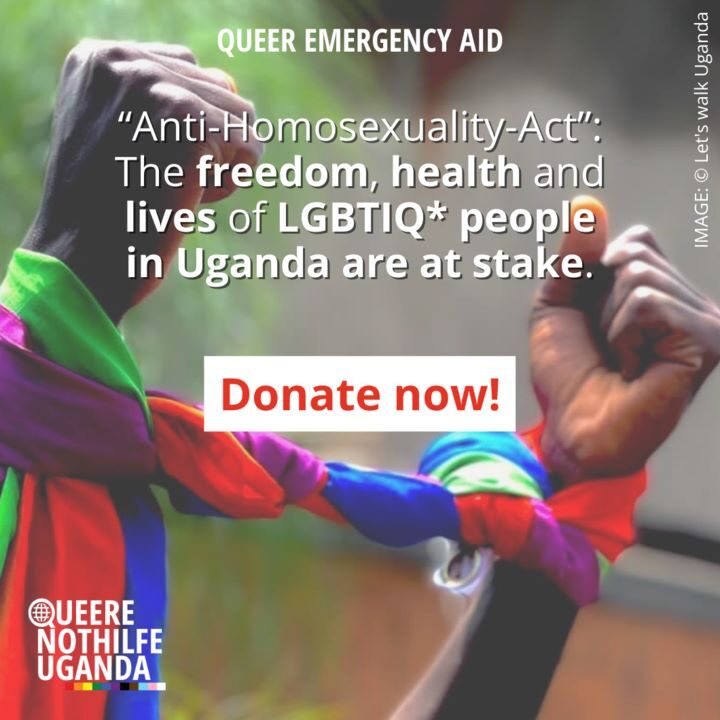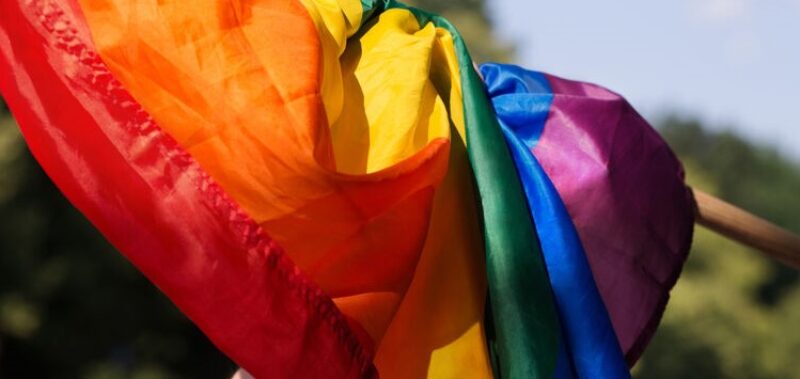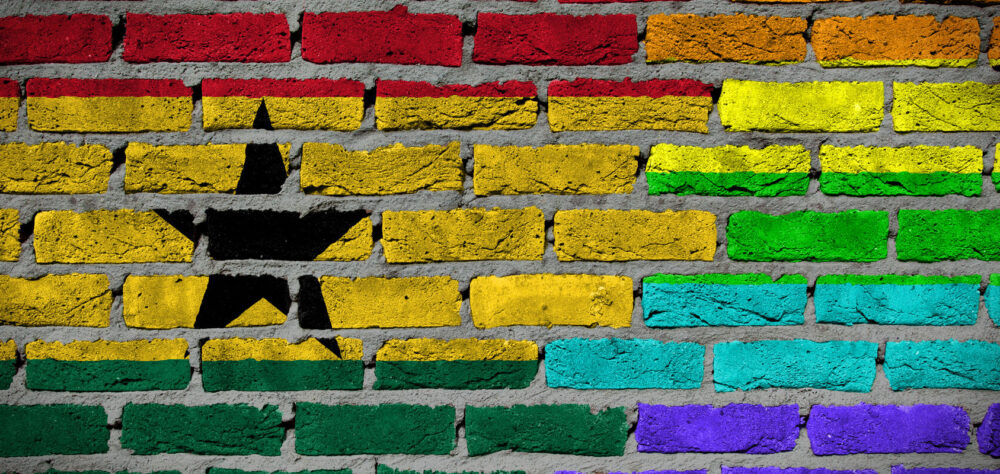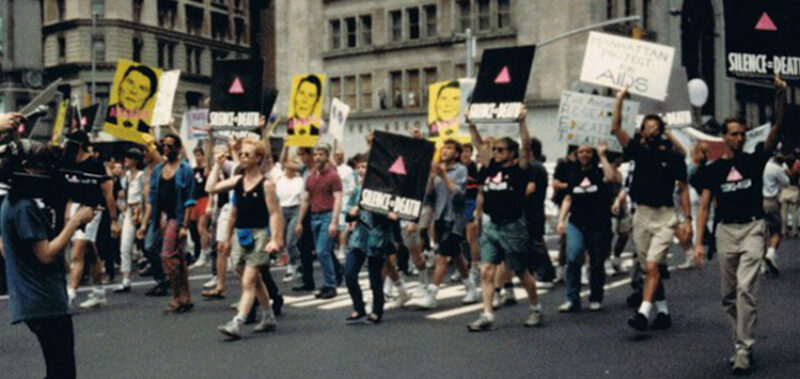The Anti-Homosexuality Act in Uganda Demands Heightened Global Attention

On May 17, we remember the day in 1990 when the World Health Organization removed “homosexuality” from the International Classification of Diseases. The International Day Against Homophobia, Transphobia, and Biphobia (IDAHOBIT) is also a reminder that queer people are still criminalized and persecuted in many countries around the world. The laws in Uganda, for example, even threaten them with the death penalty. Based on current court cases, the lawyer and activist Alex Martin Musiime urgently calls for more international solidarity.
With two high-handed laws targeting queer persons, the government now arbitrarily chooses which law to use to torment the one they accuse of homosexuality.
As I write this article, I’m overwhelmed by exhaustion and frustration from two cases. These cases involve charges on four people related to homosexuality and charges on a queer activist for allegedly inciting violence. The latter is paying the price for daring to challenge the discriminatory actions of the Speaker of the Parliament of Uganda, a figure notorious for her hostility towards the LGBTQ+ community and her involvement in various corruption scandals. In a way that has sadly become typical of the Ugandan judiciary—where accused individuals in controversial or politically charged cases are often denied bail—all five defendants in these cases have been denied bail despite lengthy stays in prison without trial. Shockingly, the activist protesting against the speaker’s actions doesn’t know the specifics of his case, nor do his lawyers, as we’ve been denied access to the prosecution’s evidence. Ironically, in these four cases, the government has chosen to apply the Penal Code and not the Anti-Homosexuality Act. Under Section 145 of the Penal Code, same-sex relations (carnal knowledge between people of the same sex) are punishable with life imprisonment on conviction. With two high-handed laws targeting queer persons, the government now arbitrarily chooses which law to use to torment the one they accuse of homosexuality. The fact that the judiciary also entertains these frivolous charges and continues to deny bail to those already incarcerated underscores the systemic bias of the judiciary against queer individuals and highlights the harsh repercussions of the Anti-Homosexuality Act, which was passed in 2023 and upheld by the Constitutional Court on April 3, 2024. Those who get formally charged in courts of law are nonetheless lucky, most violations are done without the knowledge of the court.
In October 2023, the Strategic Response Team of the Convening for Equality (CFE), an umbrella organization for queer and ally entities, documented 306 human rights violations and abuses against LGBTIQ+ persons between January 1, 2023, and August 31, 2023. Similarly, the Human Rights Awareness and Promotion Forum (HRAPF), documented 722 violations since June 2023. In March and April alone, Let’s Walk Uganda documented and responded to 27 cases of violations. These alarming figures are not coincidental; they are the result of a carefully orchestrated and systematic campaign to erase queer individuals, spearheaded by Uganda’s political leadership heavily influenced by hateful evangelical groups from the United States of America.
American Far-right Evangelicals and Their Influence
Inter-Parliamentary Conference on Family Values and Sovereignty
Following their success in 2023 and the court’s decision, members of the African Inter-Parliamentary Conference on Family Values and Sovereignty reconvened in Entebbe, Uganda, for their second conference. As expected, many speakers praised Uganda for „standing firm and passing the Anti-Homosexuality Act.“ This conference, initially held in March 2023 during the Act’s passage, was organized by Sharon Slatter, the head of Family Watch International (FWI), an organization designated as a hate group by the US civil rights group Southern Poverty Law Center. Attendees included proponents of anti-LGBTQ+ laws from Ghana and Kenya, with the Ugandan law’s main sponsor serving as the conference chair. This year, 2024, saw the same organizers with the Christian Council International headed by Henk Jan van Schothorst, a hardline conservative politician and missionary from the Netherlands, whose organization closely collaborates with American far-right evangelicals put the conference together. Henk Jan delivered the keynote address. Despite the conference’s rhetoric of „African Values and sovereignty’,“ for the second year in a row, its most influential speakers are often white, bishops, pastors, or individuals who cite the Bible and foreign writings in their speeches.“
The alarming figures are the result of a systematic campaign to erase queer individuals, spearheaded by Uganda’s political leadership influenced by evangelical groups from the USA.
Sharon Slater and Scott Lively
There exists a close nexus between Sharon Slater, Scott Lively, and other hardline evangelicals with Uganda’s hateful Anti-Queer Law. In 2009, Scott Lively, an American pastor, frequently visited members of Parliament to lecture them on what he termed the ‘homosexual movement and how it should be addressed in the East African country.’ This led to the introduction of the Anti-Homosexuality Act in 2013. Lively is also associated with Martin Sempa and Stephen Langa, fundamentalist evangelicals who oppose queer rights and engage in blackmail, shaming, and bullying of LGBTQ+ persons (Sempa is infamous for his harassment). Similarly, Sharon Slater, a frequent visitor to Uganda’s political elite and close friend of the main sponsor of ultra-conservative bills in Uganda, Sarah Opendi, has been linked to the Anti-Homosexuality Act of 2023. CNN reported that the drafts of both the Ugandan and Kenyan bills were worked on by FWI staff. Sharon’s protégé, Ms Opendi, has since introduced other bills in Parliament, including the Assisted Reproductive Technology Bill, intended to restrict surrogacy to married heterosexual couples and prevent LGBTQ+ individuals from using surrogacy to have children. Given her close ties to Sharon Slater, CCI, and other evangelical hardline groups advocating for limited bodily autonomy, Ms. Opendi is unlikely to stop.
Their Demographic Significance
The influence of these extremist groups extends beyond politicians and permeates public sentiment in Uganda, particularly through religious channels. Although Uganda’s constitution prohibits the adoption of a state religion, Christianity holds significant sway in the country, with about 84% of the population identifying as Christian according to the government. Additionally, the majority of Uganda’s media outlets are owned by pastors and politicians, further shaping public discourse. A 2018 Afrobarometer report indicated that about 67% of Ugandans place a great deal of trust in religious leaders. This number is likely higher today with the proliferation of evangelical pastors. These religious figures propagate hateful rhetoric, portraying the LGBTQ+ community as ungodly and a threat to family values. The influence of far-right evangelicals is substantial, with Open Democracy reporting that of the over $54 million spent by American groups, over $20 million was spent in Uganda over ten years to do anti-queer and anti-reproductive health rights agendas.
National Prayer Breakfast
The government of Uganda has been conducting the National Prayer Breakfast for the past 25 years. The event was adopted from the United States of America. The prayer breakfast, which takes place at the President’s residence, brings together religious leaders, government officials, judges, and others. The coordinator of the event is David Bahati, who is an ally of the Fellowship Foundation, also known as The Family, which hosts the National Prayer Breakfast in Washington. Mr. Bahati introduced the Anti-Homosexuality Act of 2013.
The court’s decision to uphold the Anti-Homosexuality Act 2023 is not detached from this influence, as evidenced by the attendance of US Congressman Tim Walberg, a pastor and anti-LGBTQ+ campaigner, as a keynote speaker at the National Prayer Breakfast in October 2023. This event served as a platform for evangelical lobby groups to rally anti-queer and anti-gender sentiments—Judges in attendance, one of whom later ruled against an LGBTQ+ organization earlier this year. Therefore, the court’s eventual decision to uphold the Act is intertwined with this capture.
After the Court’s Decision
Following the April 3rd decision, we resolved to appeal to the Supreme Court. While we acknowledge the conservative nature of the court and the potential extrajudicial influences that may compromise justice, we must utilize all avenues to challenge the law. The partial striking out of sections of the Act does not adequately safeguard the rights of LGBTQ+ persons, particularly those living with HIV. Stigma persists, and healthcare providers continue to hesitate in offering services to queer individuals despite the removal of the duty to report provision from the Act by the court. It’s crucial to note that rights are indivisible; provisions such as the duty to report or penalties for providing housing to queer persons are as unconstitutional as the Act’s other discriminatory sections. Providers of health services to LGBTQ+ persons are particularly targeted through the spread of misinformation and inciting narratives as explained by Brian Aliganyira, a healthcare provider.
International partners must prioritize LGBTQ+ rights in their engagements with Uganda and impose sanctions on those promoting hatred.
Queer solidarity is not only vital but also inevitable in overcoming the current challenges. Collaboration between grassroots organizations, activists, and international partners is much needed. International partners must prioritize LGBTQ+ rights in their engagements with Uganda, and if necessary, impose individual sanctions on those promoting hatred. The EU should lead by taking decisive measures against individuals and institutions responsible for this bigotry.
Nevertheless, the LGBTQ+ community and its allies remain steadfast in pushing back against this onslaught. This is exemplified by the diverse voices across various fora, including print and social media, opposing the law, the court’s decision, and the scapegoating of the LGBTQ+ community for political and religious purposes. The increasing number of queer activists is also reflected in the Court Petition, which now has 22 persons, compared to the 10 in the 2024 petition.
Still, with the existence of the Act, global attention should be heightened!
Alex Martin Musiime is a lawyer in Uganda, activist, and petitioner in the ongoing Challenge Against the Anti-Homosexuality Act.
Further articles on the Anti-Homosexuality Act in Uganda
Support Queers in Uganda
Diesen Beitrag teilen






